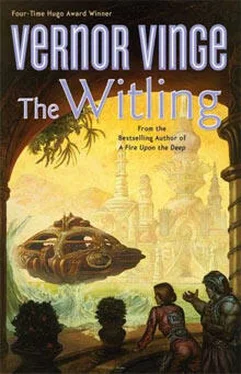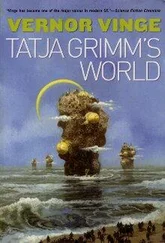Vernor Vinge - The Witling
Здесь есть возможность читать онлайн «Vernor Vinge - The Witling» весь текст электронной книги совершенно бесплатно (целиком полную версию без сокращений). В некоторых случаях можно слушать аудио, скачать через торрент в формате fb2 и присутствует краткое содержание. Город: New York, Год выпуска: 2006, ISBN: 2006, Издательство: Tor Books, Жанр: Фантастика и фэнтези, на английском языке. Описание произведения, (предисловие) а так же отзывы посетителей доступны на портале библиотеки ЛибКат.
- Название:The Witling
- Автор:
- Издательство:Tor Books
- Жанр:
- Год:2006
- Город:New York
- ISBN:0-765-30886-X
- Рейтинг книги:3 / 5. Голосов: 1
-
Избранное:Добавить в избранное
- Отзывы:
-
Ваша оценка:
- 60
- 1
- 2
- 3
- 4
- 5
The Witling: краткое содержание, описание и аннотация
Предлагаем к чтению аннотацию, описание, краткое содержание или предисловие (зависит от того, что написал сам автор книги «The Witling»). Если вы не нашли необходимую информацию о книге — напишите в комментариях, мы постараемся отыскать её.
The Witling — читать онлайн бесплатно полную книгу (весь текст) целиком
Ниже представлен текст книги, разбитый по страницам. Система сохранения места последней прочитанной страницы, позволяет с удобством читать онлайн бесплатно книгу «The Witling», без необходимости каждый раз заново искать на чём Вы остановились. Поставьте закладку, и сможете в любой момент перейти на страницу, на которой закончили чтение.
Интервал:
Закладка:
He stepped into the morning sunshine, and walked down the path toward the beach. The sky was filled with a rippling of clouds, and it wasn’t quite as tropically warm as the day before. This place was beautiful, there was no question about that. And it was beginning to look as if he had all the time in the world to explore it; except for a small group lounging on the beach a quarter of the way around the lake, there was no one to stop him. Perhaps he and Yoninne weren’t really prisoners anymore. Only his inability to teleport kept him prisoner here: he couldn’t enter a single building—except that one they had punched a doorway in.
Bjault walked along the edge of the woods, and listened to the animals scurrying back and forth among the wide-leafed tropical trees. They seemed relatively tame; he had seen several hop across the narrow path. Ahead, a mouselike creature spread a silken web between two trees. It was an amazing fact: Ajão had seen no animal life that didn’t look mammalian. Oh, most of the ecological niches were filled: there were “birds” of sorts, and from the finned monsters he had seen in Azhiri murals, he knew there were sea creatures. But the birds had fur and suckled their young, and the sea monsters were clearly air-breathers. There was even an insect analog here on Giri, though up close the creatures looked more like miniature shrews.
Bjault could think of only one explanation for all this. Back fifty or one hundred million years ago, Giri had had reptile and insectoid forms, and the first mammals were coming on the scene. But one of those mammals was a mutant like none ever seen on any of the thousands of worlds man had visited: this animal could teleport—“reng” was the Azhiri term—matter. Certainly the creature hadn’t been able to teleport itself; probably the best it could do was reng tiny masses just a few centimeters. But consider: if the matter teleported was within the brain or the heart of an enemy, then that enemy would most likely be killed. So the lucky renging mutant was the undisputed master of its environment. Considering how rare the mutation must be, it was not surprising that no other species ever learned to use the Talent or defend against it. All other macroscopic fauna had been wiped out, and now every creature was descended from that single fluke. Bjault shuddered.
Of course the Azhiri race itself had come along millions of years later, just as Homo sapiens had only developed in the latter stages of mammalian evolution. But where their animal precursors could teleport only a small fraction of their body mass, a trained Azhiri could reng whole tons. At least most Azhiri could—Pelio was an exception, a cripple. Apparently, he couldn’t even defend himself against the Talent.
Bjault noticed a small transit pool half-hidden in the trees up the hillside. He left the beach to climb toward it. There really wasn’t much reason to, but he had nothing else to do. He would just have to be patient another day or two. Leg-Wot was so close to recovering their equipment. He entered the clearing and walked to the marble rim of the pool. Leaves and other forest debris floated on the surface. Apparently this pool was little used. Bjault wondered how the Azhiri managed to avoid accidents. Sooner or later, some poor fellow would get into a pool just as someone else arrived, and be chopped in half, his lower body teleported wherever the newcomer had departed. Perhaps the Azhiri clairvoyance—“seng,” or whatever they called it—was even more effective than Leg-Wot reported.
It suddenly occurred to him that there was another reason why accidents didn’t happen. It takes energy to cut a solid or liquid, to break the molecular bonds along the surface of the cut. If—as it seemed—the Azhiri didn’t expend energy to do their tricks, then there was only one way they could cut an object by use of the Talent: if the materials along the cleavage were chemically identical at both the departure and arrival points, then there was little net energy expense during a teleportive exchange. Thus you could reng two equal volumes of water. (Or, if you wanted to kill somebody, you could reng two equal volumes of your victim’s medulla oblongata; jumble his brain, in effect. Witlings led a precarious existence indeed on Giri.)
Bjault gazed idly across the clearing, and happened to be looking right at the man as he popped into existence, then dropped three or four centimeters onto the deep grass. The archaeologist rose abruptly to his feet, but not before two more men materialized.
“Don’t move, witling,” the first of them said. “The prince requires your presence.” All three wore the standard kilts of the household guard, but there was something tense and furtive about them. Ajão had been dealing with bureaucratic and military types for well over a century, for so long that he almost had a feeling for their lies. These three behaved like soldiers in enemy territory. He took a step backward, toward the path that led to the beach. One of the three disappeared, popped back into existence a little way down the trail. At the same instant an incredibly sharp gust of wind struck Ajão’s ankles, knocking his feet out from under him. Two of the men closed in, grabbing his arms. “We can kill you before you even start to scream. Don’t hinder us, and we may let you live.” Ajão gritted his teeth in pain and fear as they dragged him across the grass toward the transit pool. This was kidnapping, not the lawful activity of jailers! And the difference was not academic—he might never see Yoninne or the maser.
As his abductors reached the pool, the fellow bringing up the rear screamed, and there was an abrupt snapping sound, like nearby thunder; Ajão looked up to see the man’s body smash into the bole of a tree at the far side of the clearing. Just at the entrance to the clearing was a fourth man, a dark-skinned Azhiri in a plain green kilt. He stood unmoving, but Ajão’s captors went pale with fear. “Guildsman,” one of them shouted, and when he looked down at Bjault there was murder in his eyes.
There was a second snap of thunder, and his would-be assassin was literally blown away. The ground slammed up against Ajão and he felt nothing more.
Beyond the railing, the city stretched as far as he could see. Individually, the buildings were beautiful, their stone and timber construction blended subtly together. Even the largest of them, three and four stories tall, were part of an immense garden. Vines and tree limbs had been guided through the latticed balconies and rooftop porches, to set off with tones of green and brown the blue paint of the outer woodwork.
It had to be a city, but no building stood closer than one hundred meters from another. Only the pathless gardens and their trees and flowers and tiny ponds lay between them. It reminded Ajão of the planned cities they were just beginning to build on Homeworld when the Novamerika Expedition was launched forty years before. Those cities had been made possible by the advanced Homeworld technology with its computer-directed helicopter transportation—whereas the Azhiri achieved the same effect without mechanical tricks. Ajão felt a little envious. Their city might be thirty kilometers from east to west, yet the Azhiri could jump from one end of it to the other with scarcely more than a two-meter-per-second jolt.
Ajão was lying on a soft couch set on one of the roof porches. Except for the soaked condition of his flight suit, and the soreness in his legs, he was quite comfortable. This was hardly a prison cell. The furniture and art work excelled what Pelio had provided them. A wide, low table sat alongside the couch. Its surface bore two circular paintings, each more than a meter across. They looked almost like maps: the blue representing ocean, the green and brown and white the land. Notations in the Azhiri syllabaric script marked various points. There were even little sea monsters painted on the blue… Why, these were maps, polar orthographic projections! One disk represented the northern hemisphere, and the other the southern. What a strange projection to use; the equatorial continents were distorted almost to unrecognizability.
Читать дальшеИнтервал:
Закладка:
Похожие книги на «The Witling»
Представляем Вашему вниманию похожие книги на «The Witling» списком для выбора. Мы отобрали схожую по названию и смыслу литературу в надежде предоставить читателям больше вариантов отыскать новые, интересные, ещё непрочитанные произведения.
Обсуждение, отзывы о книге «The Witling» и просто собственные мнения читателей. Оставьте ваши комментарии, напишите, что Вы думаете о произведении, его смысле или главных героях. Укажите что конкретно понравилось, а что нет, и почему Вы так считаете.








